Natalia Bondy
10 years have passed since the date of death of the talented composer and a wonderful person Edison Vasiljevich Denisov. I haven’t even noticed how they have flown by. It seems that our last meeting took place a few days ago. It’s April now, the month when Edison Vasiljevich was born. On April, 6th, 2006 he would have been 77 years old. Here are these two dates. While looking at them I frequently feel some strong inexplicable pain caused by the absurd and irreparable loss of this person. This makes me remember again everything that was somehow connected with his name in my life.
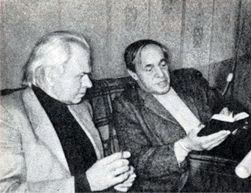 |
|
| With Pier Boulez. Moscow 1990. |
Nowadays people in Russia quickly forget everyone and everything. It is perhaps necessary for them now to forget and run forward faster. Nevertheless, I’d like this person to be remembered, and his music to sound more often in his homeland than far away from it.
Completely accidentally I had a happy chance to associate with Edison Vasiljevich on different occasions for about 20 years, especially during the last years of his life.
I remember our first meeting with Edison Vasiljevich perfectly. It was 1976. That year I was working in a sound-recording laboratory of the Moscow Conservatory with an outstanding person, Natalja Sergeevna Shepeleva, great-granddaughter of A.S.Pushkin. She was the head of the record library of the Moscow Conservatory at that time. Natalja Sergeevna was sitting in a huge room. It was a storehouse of musical records. There were a lot of shelves along the walls, and they were full of gramophone records, films, and disks up to the ceiling. To the right from the window there was an ancient table with Natalja Sergeevna’s armchair, and a so-called “visitor’s armchair” stood right opposite. Many celebrities had been sitting in this armchair, and first of all probably all leading professors of the Conservatory of that time.
Once I saw a slender man almost running into the library. He wasn’t tall; he was wearing a dark polo-neck sweater and had a splendid head of hair. He entered Natalja Sergeevna’s study, sat down into the “visitor’s armchair” and they had been discussing something for a long time. That was the day when we got acquainted. The point was that Mitya, the son of Edison Vasiljevich was studying at the Conservatory at that time. As he was quite playful, he was giving his father a lot of trouble. There were some young girls who worked in the laboratory with me and Natalja Sergeevna, and Mitya was on friendly terms with many of them and therefore frequently visited us. So Edison Vasiljevich sometimes dropped in to learn the latest amorous news about his son.
Well, that was not the only reason. Behind the closed doors of Natalia Sergeevna’s study it was possible to discuss without anxiety many problems of conservatory’s musical life, and the whole country.
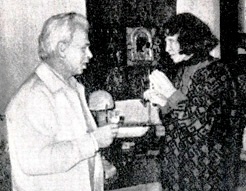 |
|
| With Sofia Gubaidulina. Berlin 1986. |
Edison Vasiljevich was a charming person, very vivid, sociable and kind. He had been a lecturer on the military-conductor’s department and then on the department of orchestration, but the class of composition he was never given with stupid persistence. Only in 1990 Denisov got his first official student in the class of composition – a post-graduate Jury Kasparov. So Edison Vasiljevich showed up in the Conservatory very often, and we had a chance to talk sometimes.
He was born in Tomsk on April 6th, 1929. Edison learned to read very early, he was fond of music and mathematics. He had a good example of his father, a talented radiophysicist. By the way, the choice of the child’s name was concerned with his father’s affection towards an outstanding inventor. Having completed his studies at school Denisov entered the State University of Tomsk on the department of physics and mathematics. His passion for music appeared already in school. It was rather unexpectedly for his parents as several years before he refused to go to a music school because it was considered a girl’s business. But lately this passion turned into Edison’s graduating from the Music College of Tomsk with honors.
At the same time Edison was about to complete his studies at the University. He was a gifted young specialist and therefore he was offered to stay at the University as a lecturer. So he had to make a choice which was not an easy thing to do. He had to estimate his composer talent impartially. And in this situation as in may others Denisov took a completely unexpected decision but the only right one. He decided to write a letter to Dmitry Dmitrievich Shostakovich!
It was a great surprise for a common youth from Siberia to have an answer. This correspondence with a world known composer led to Denisov’s entering the Moscow Conservatory in 1951.
Later there were fascinating studies with V.Y.Shebalin, post-graduate course and a long period of official non-recognition. The young talented composer was completely ignored in his homeland. This situation changed only in the mid 1980-s when the entire world was discussing the music of Russian composer Denisov. In 1990 he became a member of the Secretariat of Composer’s Guild of USSR.
Let us be carried to the year 1991. That spring I visited Paris for domestic reasons. At that time Edison Vasiljevich was living in Paris as he had been offered a job by Pierre Bulese, the head of the famous IRCAM ( l’Institut de Recherche et Coordiation Acoustique/Musique). So Denisov was working at this Institute. IRCAM was specializing in researches of new acoustic potential. Denisov was interested in possible enlargement of musical space with the assistance of computer hardware. He also took an interest in interaction of musical instruments with computer software. During his work at IRCAM Denisov finished his composition ‘On the shroud of the frozen pond…’ which used computer technics.
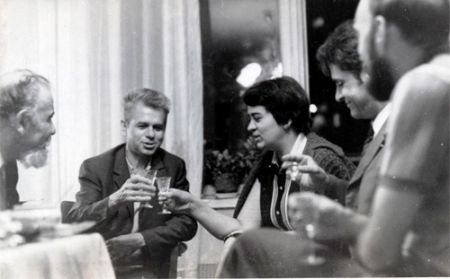 |
| (from the left to the right) Lev Kopelev, E.Denisov, G.Grigorieva (wife), F.Iskander |
So I called Edison Vasiljevich and he offered me to meet him in the park next to IRCAM. By the way, this Institute is situated near the Center Pompidou where there are always thousands of people, especially in the nice spring weather. On the square in front of the Center Pompidou there are always some dances, performances, discussions, meetings of the youth and so on. And right across the street there is a silent modest building where they carry out various researches in music.
I arrived some minutes earlier. So I had time to walk a little and plunge into that fascinating unknown world. I had been eager to see IRCAM for a long time and that is why Edison Vasiljevich wanted me to come there. The fact is that you need a special pass to enter IRCAM, and that pass was issued for me at the instance of Denisov.
Finally I saw him in the crowd in his usual dark polo-neck sweater, with his live eyes and prompt speech. Edison Vasiljevich asked me to deliver a number of letters to his Moscow friends (at that time postal service didn’t work well and letters were extremely slow and sometimes even were lost), I told him the latest Moscow news and we went to IRCAM. There were dark and cool inside. I could see huge computers everywhere and silent people whisking between them. Denisov was trying to explain me what was going on but I was completely stunned by everything I saw. All I can remember is the feeling of great delight…
I have to mention that in the beginning of the 1990-s I worked as an editor of music programs for a new Russian TV company. That period was a beginning of our close friendship with Edison Vasiljevich. We had an opportunity to tell about his work, about his heading the Association of Contemporary Music, new-born after 59 years of prohibition, and finally about himself, a world known composer. We did that through creating various music programs.
I remember clearly how we worked on the program dedicated to one of the last Paris operas, Debussy’s ‘Rodrigo and Chimena’. We were so interested for the following reason.
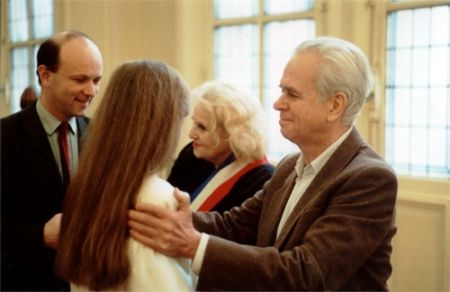 |
| 1995. During the wedding of his daughter Katya. Paris 1995. |
It is wide known that Debussy had written only one opera ‘Pelleas and Melisande’. And suddenly a new lost score of ‘Rodrigo and Chimena’ appeared, although unfinished. Edison Vasiljevich was asked to complete the opera and partly orchestrate it. I think he was chosen because of his affection towards French music and culture.
The first night of ‘Rodrigo and Chimena’ was to be performed in Lyon and we were to shoot this great event. But at that time a business trip abroad was connected with various difficulties and we didn’t have enough time to draw up all the necessary documents. Only after that first success Edison Vasiljevich agreed to tell us everything concerned with that event.
It turned out that Claude Debussy’s opera ‘Rodrigo and Chimena’ was first performed on the stage of the Lyon Opera on May 14th, 1993. That was precisely a century later the day Debussy finished his work on it. For a hundred years all musicologists were sure there were not such an opera. Everybody knew Debussy had been working on it, but the composer himself was telling all his friends that the manuscript had been burned. He was saying that one day he had been working near the chimney and accidentally jogged it into the fire. This story isn’t clear till nowadays. I think that musicologists should investigate the reason why Debussy didn’t want anybody to know about this opera.
It existed for sure and was completely finished by Debussy for a clavier. But as many other manuscripts there were a lot of unfinished fragments and gaps…
The first act of the manuscript Debussy dedicated and gave as a present to Gaby Dupont, a young beautiful woman who he lived with for 10 years. She kept it until her death. The second and the third acts were found afterwards by pianist Alfred Korto who collected works of Debussy. Right before his death Alfred Korto sold the manuscript ‘Rodrigo and Chimera’ to an American collector and billionaire Robert Leman. Leman put it then to the New York Library and it was considered for a long time to be lost or burned-out, and nobody was interested by it.
 |
|
| With Luchano Berio. |
Only in the early 1980-s an English musicologist Langen Smith went to New York and found this manuscript in the library. He achieved a permission to make a photocopy and was the first to decipher the manuscript. In about 1991 Edison Vasiljevich was asked by a French recording company ‘Erato’, ‘Duran’ publishers and the Lyon Opera to orchestrate and complete this Debussy’s opera.
Edison Vasiljevich agreed gladly. This work took a lot of time, for a year and a half he worked on nothing but this opera. In the beginning he tried to get used to this music, he played the piano for hours and listened to it. Sometimes it was difficult for him to discern a harmony or a note. But after having spent some time playing and listening, Edison Vasiljevich managed to make out everything. He hardly changed anything, he just filled the gaps left by Debussy and tried to do it as Debussy would do himself. Edison Vasiljevich strictly followed the rules laid down by Debussy.
Once the opera had been staged in Lyon it became clear that the music is extremely expressive and the opera itself is a masterpiece of theatrical effectiveness. By the way, the staging and the cast were a great work To invite such a producer as George Levadan was a wise decision. At that time modernism was quite popular in Europe, but operas shouldn’t be staged as modernistic plays. Modernism destroys opera’s music and brilliance. In our case the choice of a producer was perfect, and the light and colors of that staging were very well thought-out. George Levadan was a great music-lover himself, and all his work was according to Debussy’s music.
Moreover, to have such a conductor was also a great luck. Kent Nagan is one of the best in Europe. He did a wonderful job with an orchestra as well as with chorus and soloists. When he started working the chorus made an amazing improvement just in two days. An outstanding conductor!
The most important for Edison Vasiljevich was to reproduce Debussy’s language. It was not a kind of stylization; Edison Vasiljevich just wanted to preserve every note written by Debussy. Where there was something missing he made some additions that didn’t complicate Debussy’s language at all. Neither the conductor nor the producer could tell the music of Debussy from the one of Edison Vasiljevich. Nobody could. Edison Vasiljevich even asked Nagan to think about that. But nobody could tell him which acts were not written by Debussy. And that was essential for Denisov. He only wanted to make people who would come to listen to that opera feel it had been written by Debussy from the beginning to the end.
 |
| With his son Mitya. Moscow 1960. |
In the summer of 1994 Edison Vasiljevich completed his Second Chamber Symphony that was one of the most important compositions for him. A Saturday morning in August he was to come to a TV studio for the shooting of some program. Later on he had a rehearsal of the new symphony with a modern ensemble. The shooting staff had gathered by 11 a.m. and we had been waiting for Edison Vasiljevich…
But he didn’t come in due time, nor he came later. Not an hour later and not two hours later. Some people started complaining. But I was sure something very serious had happened. It was impossible for Edison Vasiljevich not to come as he was a very responsible person. He always kept his word, in any situation. That is why I was sure there was some state of emergency. Later that evening I called Denisov’s apartment, and his son Mitja told me the frightful details of what had happened.
Earlier that day Edison Vasiljevich was going to the shooting from the Moscow suburb Ruza where he often stayed at the House of Composers. A highway towards Moscow was totally free. But in the opposite direction there was a long line of cars. Suddenly, one car of that line drove out into the center strip and collided with Denisov’s car. The damage was awful. Edison Vasiljevich was taken to the local hospital in Ruza. He was in a very grave condition, between life and death.
Later it became clear that nobody in Moscow could help Edison Vasiljevich. A number of internals were injured. Russian medicine was powerless. And then Jacques Chirac, president of France, sent a special reanimation airplane that had been constructed to move seriously injured patients. Edison Vasiljevich met Jacques Chirac when he had been the mayor of Paris. And now Denisov was brought unconscious to the best hospital of Paris where they treat only heroes of France.
For about two months Edison Vasiljevich had been in coma, and when he regained consciousness he was very surprised to find out he was in Paris. Here Denisov was literally brought together piece by piece and put on his feet. French physicians had done everything possible for that. Then Denisov was moved to another hospital next to Paris for after-care and rehabilitation.
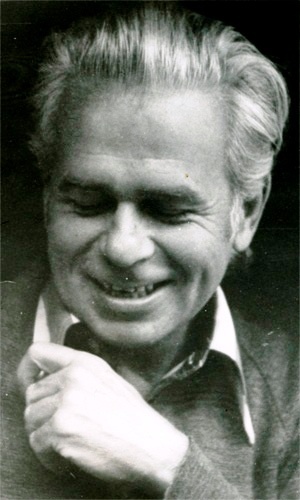 |
|
| E.Denisov. August 1972. |
In the late autumn of 1994 I came on business to Paris and of course called Katerina, Denisov’s wife. She had a hard period at that time. Two little daughters who claimed permanent attention, uncomfortable environment of a strange country, disorder in family life. Edison Vasiljevich stayed at hospital, and every time Katerina visited him she had to bring her daughters as there was nobody to leave them with, and having a baby-sitter was too expensive.
I offered Katerina my help. She accepted it gladly. Once Katerina asked me to take a walk with the girls so she could go on some urgent business. Another time, on November 12 I came to hospital to see Edison Vasiljevich. He had a cubicle. That day was feeling bad, maybe because such a lively man had to stay in bed.
In about two weeks Denisov was moved to another hospital in Percy for rehabilitation. It was quite a long way from Paris (as in Paris an hour-and-a-half trip is considered long). I came there to see him on November 24th.
Edison Vasiljevich wrote some letters and asked me hand them over. He tried to look cheerful but it was clear that he didn’t feel well. He told me he had a lot of work, but it was still difficult for him to write. Fortunately his head wasn’t injured in the accident so he could work. On his desk there were some sheets. Edison Vasiljevich said he was asked to compose the third act for the opera ‘Lazarus’ by Schubert.
This story is very interesting and quite unusual. Schubert wrote two acts of this opera, ‘The Death of Lazarus’ and ‘The Burial’. Then Schubert found out he had a fatal illness and decided not to write the third act, ‘The Revival of Lazarus’. Edison Vasiljevich said it was not easy for him to compose about an hour-long act and not imitate Schubert. At the same time he didn’t want people to leave the opera after two acts saying, ‘Oh, Denisov’s part has started…’
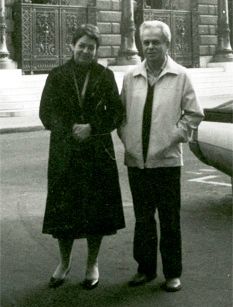 |
|
| With the first wife Gaina Grigorieva. “Foam of days” premiere. Pevu. the building ot the opera house. Paris 1986. |
Moreover, while staying in hospital Edison Vasiljevich was working on the music to a Yuri Ljubimov’s staging of ‘The Cherry Orchard’. Denisov affirmed then that Chekhov was the most congenial soul for him among all Russian writers.
My last meeting with Edison Vasiljevich in Paris took place on the 20th of March, 1995. Denisov called me the day before and asked to come to them the next day. I accepted the invitation gladly. The French state provided Denisov with an apartment. It was not situated in downtown but at least next to an underground station. Denisov and his family were allowed to pay only a half of the rent (as the apartments were extremely expensive in Paris at that time, the same as in Moscow nowadays). Edison Vasiljevich had to go to hospital periodically, but in general he lived at home with the family, his wife Katerina and two daughters.
I came in due time and found that apartment in a new block of flats. The apartment turned out to be quite small; there were a narrow kitchen, a small nursery, a dining room and a study. In the study I could see a large open piano and a lot of sheets scattered all around it. Farther there was a small bedroom.
I was very surprised to find out that it was Katerina’s birthday that day and there were some quests on this occasion. Among them was Denisov’s elder daughter Katya (who was called ‘Kisa’ so not to confuse her with her mom) with her husband, a French conductor. Then, there was Denisov’s publisher monsieur de Duke and a film director from Leningrad Valery Ogorodnikov, who used Denisov’s music in his films. Here are all the guests.
That evening we had dinner with some wine and had talked a lot. It was very interesting. Edison Vasiljevich walked briskly but limped a bit and got tired very soon. On a whole it was clear that his state of health had improved greatly. He talked a lot about his new compositions and said he was missing Moscow very much.
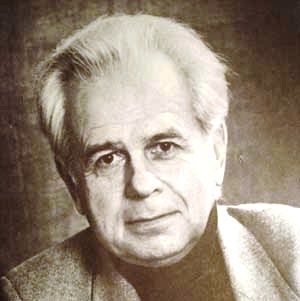 |
| E.Denisov. Moscow 1960. |
In February of 1996 Denisov came to Moscow for 10 days. We met, and he told me he couldn’t stay long as his course of medical treatment wasn’t completely finished. On the 5th of March at 8 a.m. he had to be back at his hospital. He felt all right despite the fact that he still had to use a walking stick. And twice a month he had to go to hospital in Paris. So these 10 days on Moscow were filled with a lot of things to do.
First of all, Edison Vasiljevich had a meeting with the audience of ‘Orpheus’ radio channel. It was appointed on February, 26th. But the most important was the Edison Vasiljevich’ recital on February, 29th. It was held in Moscow conservatory and was a great success.
The hall couldn’t seat all the audience. People were everywhere, on the window-sills and in the gangways. Edison Vasiljevich was asked to play an encore several times. All the performers showed great enthusiasm and the concert was a success. The program was composed by Edison Vasiljevich himself and he did it very carefully. There were only premieres, for Moscow audience and even for the whole world.
It was the first time he performed “Points and lines” for 2 pianos in 6 hands. Furthermore, Sonata for a saxophone and a violoncello, and Trio for a flute, a bassoon and a piano. Next, ‘Archipelago of dreams’, three romances on the poems of Jean Mae for a soprano, a flute, a vibraphone and a piano. These compositions were written after the accident and were all performed for the first time.
In 1970 Edison Vasiljevich wrote a band piece ‘Painting’, the first after graduating from the conservatory. The choice of such a title wasn’t accidental. First of all, it was dedicated to a friend of Edison Denisov, a gifted painter Boris Berger. Besides, painting was extremely important for Denisov himself. Time and again he said that as a composer he had taken more from painters then from his colleagues.
 |
| (from the left to the right) E.Denisov, Mr.Le-Dyuk, daughter Katya with husband, Natalia Bondi. |
‘Every person had to pass a certain period of experimentation. It might be shorter or longer. But if you don’t seek you won’t find anything. For ten years after I graduated from the conservatory I had been seeking. I didn’t write anything serious, just short pieces for small ensembles. I had been reading, listening and analyzing to find my place in the world of music, to determine the most simple and intelligible style and language for me’.
And finally,
‘Beauty is one of the essential concepts of art. Nowadays many composers seem to seek for new beauty. And it is not only the question of the beauty of sound which has nothing to do with the beauty of appearance. I am talking about the beauty of thought as it is understood by a mathematician, for example, or as it was understood by Bach and Webern…’
For Specialradio. May 2006
Leave a Reply